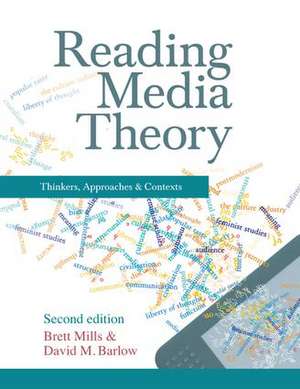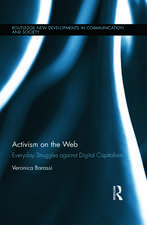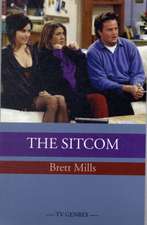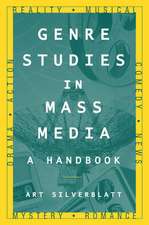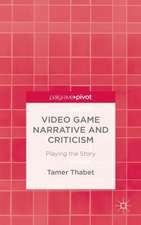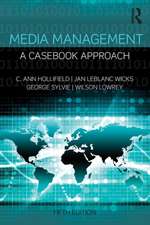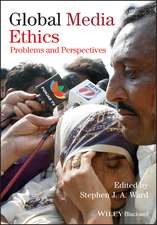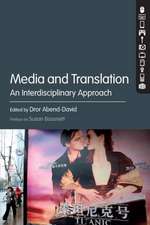Reading Media Theory: Thinkers, Approaches and Contexts
Autor Brett Mills, David M. Barlowen Limba Engleză Hardback – 8 oct 2015
This groundbreaking volume – part reader, part textbook - helps you to engage thoroughly with some of the major voices that have come to define the landscape of theory in media studies, from the public sphere to postmodernism, from mass communication theory to media effects, from production to reception and beyond. But much more than this, by providing assistance and questions directly alongside the readings, it crucially helps you develop the skills necessary to become a critical, informed and analytical reader.
Each reading is supported on the facing page by author annotations which provide comments, dissect the arguments, explain key ideas and terminology, make references to other relevant material, and pose questions that emerge from the text.
Key features:
- Opening chapters: ‘What is theory?’ and ‘What is reading?’ bring alive the importance of both as key parts of media scholarship
- Pre-reading: substantial Introductory sections set each text and its author in context and show the relevance of the reading to contemporary culture
- Post-reading: Reflection sections summarise each reading’s key points and suggests further areas to explore and think about
- 4 types of annotations help you engage with the reading – context, content, structure, and writing style …. as well as questions to provoke further thought
- Split into 4 sections – Reading theory, Key thinkers and schools, Approaches and Media Theory in context
- New chapters on New Media, and Audiences as Producers
| Toate formatele și edițiile | Preț | Express |
|---|---|---|
| Paperback (1) | 497.49 lei 43-57 zile | |
| Taylor & Francis – 10 mai 2012 | 497.49 lei 43-57 zile | |
| Hardback (1) | 1000.27 lei 43-57 zile | |
| Taylor & Francis – 8 oct 2015 | 1000.27 lei 43-57 zile |
Preț: 1000.27 lei
Preț vechi: 1219.84 lei
-18% Nou
Puncte Express: 1500
Preț estimativ în valută:
191.40€ • 200.37$ • 158.37£
191.40€ • 200.37$ • 158.37£
Carte tipărită la comandă
Livrare economică 07-21 aprilie
Preluare comenzi: 021 569.72.76
Specificații
ISBN-13: 9781138128125
ISBN-10: 1138128120
Pagini: 704
Dimensiuni: 189 x 246 x 38 mm
Greutate: 0.45 kg
Ediția:Nouă
Editura: Taylor & Francis
Colecția Routledge
Locul publicării:Oxford, United Kingdom
ISBN-10: 1138128120
Pagini: 704
Dimensiuni: 189 x 246 x 38 mm
Greutate: 0.45 kg
Ediția:Nouă
Editura: Taylor & Francis
Colecția Routledge
Locul publicării:Oxford, United Kingdom
Cuprins
1. Introduction Part I: Reading theory 2. What is theory? 3. What is reading? Part II: Key thinkers and schools of thought 4. Liberal press theory 5. F.R. Leavis 6. The Frankfurt school 7. Harold D. Lasswell 8. The Columbia school 9. C. Wright Mills: Mass society theory 10. The Toronto school 11. The Centre for Contemporary Cultural Studies Part III: Approaches to media theory 12. Political economy. 13. Public sphere 14. Media effects 15. Structuralism 16. Feminist media theory 17. Cultural theory 18. New Media 19. Postmodernism. 20. The information society Part IV: Media theory in context 21. Production 22. Texts 23. Audiences 24. Audiences as producers
Descriere
This groundbreaking volume – part reader, part textbook - helps students to engage thoroughly with some of the major voices that have come to define the landscape of theory in media studies, from the public sphere to postmodernism, from mass communication theory to media effects, from production to reception and beyond. But much more than this, by providing assistance and questions directly alongside the readings, it crucially helps students develop the skills necessary to become a critical, informed and analytical reader.
